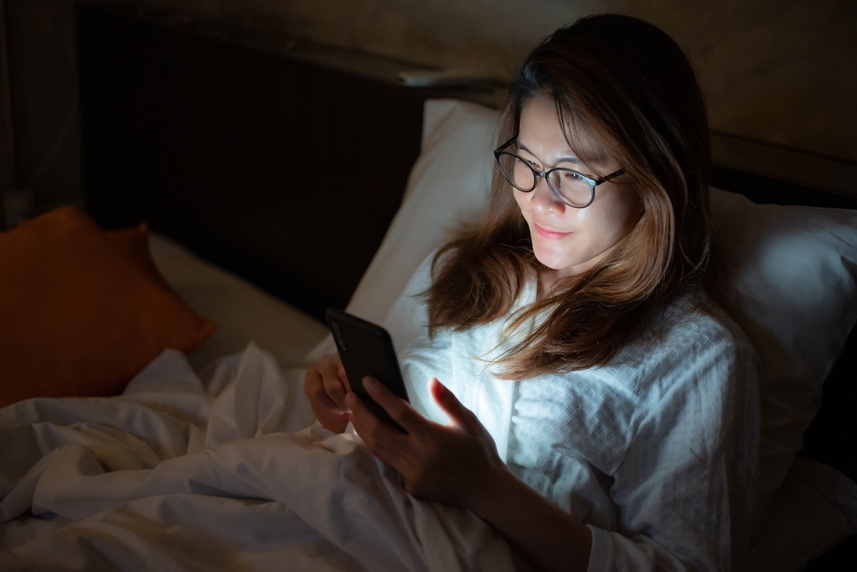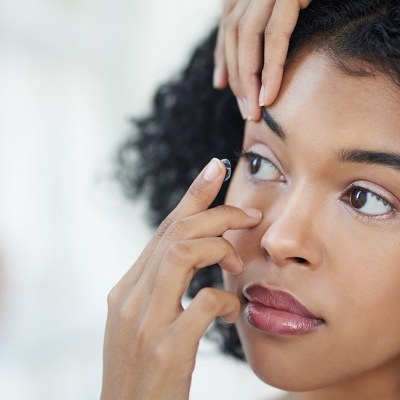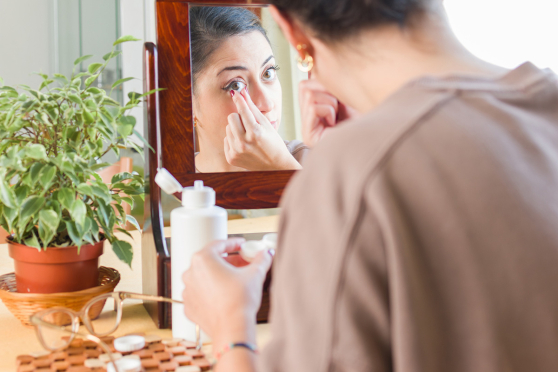Do I really need blue light blocking lenses?
There’s a lot of talk about the potential dangers of blue light. We’re separating fact from fiction so you can take charge of your eye health.

Do any of these scenarios sound familiar? You're tucking in for the night, but you do one last social media scroll before you doze off. You're burning the midnight oil on your laptop for a work project. Maybe you're watching some late-night TV to relax. In any of these situations, you're giving your eyes a hefty dose of blue light, but does that really impact your eye health? Here's a look at some facts.
What is blue light?
Blue light is a short, high-energy wavelength of light. Most of the blue light you're exposed to comes from sunlight. But you can also get it from:1
- Computers
- Fluorescent lights
- LED lights
- Smartphones
- Tablets
- Televisions
Blue light can mess with your circadian rhythm. Your circadian rhythm is your internal clock with cycles that rise and fall over a 24-hour period, helping you fall asleep and wake up.2 Blue light triggers specific cells in your eyes that suppress melatonin and boost alertness.3 Melatonin is a hormone that your brain produces in response to darkness. Anything that suppresses melatonin at the wrong time can get in the way of good sleep.4
Case in point: Staring at screens right before bed makes you less sleepy, makes it take longer for you to fall asleep, and hurts the quality of sleep.5 The blue light you’re getting from watching TikTok videos in bed is actually telling your brain that it’s time to get up and go.
One solution that’s often recommended is to wear blue light blocking lenses, but do they really work?
Blue light glasses and readers can help protect your eyes and sleep schedule. Save $25 by entering the code UHCM25 at checkout.
Blue light blocking lenses and sleep
Better sleep is the biggest benefit of putting a blue light blocking coating on your lenses. A 2020 analysis of 12 studies examined the effect blue light blocking lenses had on sleep.6 Eight of those studies showed the lenses improved sleep for healthy adults. What's more, the lenses improved sleep for people with insomnia and other health conditions where sleep is often an issue, such as attention deficit hyperactivity disorder (ADHD). (The other 4 studies concluded the lenses had no effect.)
Blue light blocking lenses and eye fatigue
Staring at a screen can lead to eye strain, no matter what your prescription, lens material, or lens coatings. Sometimes blue light blocking coatings are promoted to help lower eye fatigue during computer work.
Unfortunately, most trials show that these lenses don't help improve eye fatigue or strain, compared to normal lenses.7
Rather than rely on blue light blockers to give your eyes relief, practice the 20-20-20 rule. Every 20 minutes, take your glasses off for 20 seconds and look 20 feet or more away from you.8 It can really help reset your eyes.
Blue light blocking lenses and eye health
There's a lot of talk about the potential harmful effects blue light may have on eye health. The concern is that it may raise the chance of eye diseases, such as age-related macular degeneration (AMD), a leading cause of vision loss in older adults.9
You may be able to breathe a sigh of relief, according to Harvard Medical School. The amount of blue light coming off your devices may not be enough to harm your eyes. There is no data to show that wearing blue light blocking lenses is helpful for your eye health. Your eyes are exposed to far more blue light from the sun than from your computer. Blue light blocking lenses won't prevent AMD or other eye diseases.10
When to buy blue light blocking lenses
All this said, if you’re buying new lenses, there are times when adding a blue light blocking coating may be a good choice.
Think about your work schedule. If you're on the computer late at night, blue light blockers can help keep your circadian rhythm on track. The same applies if you have a habit of scrolling through social media in the wee hours.
A blue light blocking coating is an extra cost. It’s a good idea to talk to your optometrist about how this affects the price of your glasses. If the coating isn’t an option, there are other ways to lower your exposure. Setting your screen night mode/night shift to dial down the brightness is a big one. This can help almost as much as blue light blocking lenses.
Reduce exposure from your digital device with a blue light filtering screen protector. Get 30% off when you enter the code UHCMEMBER30 at checkout.
Sources:
- Digital devices and your eyes: bluelight and your eyes Prevent Blindness America.
- Circadian rhythms and circadian clocks Centers for Disease Control and Prevention, last reviewed April 2020.
- Module 2: The color of the light affects circadian rhythms Centers for Disease Control and Prevention, last reviewed March 2020.
- Melatonin: what you need to know National Institutes of Health, last updated July 2022.
- How electronics affect sleep Sleep Foundation, last updated December 2020.
- Interventions to reduce short-wavelength (“blue”) light exposure at night and their effects on sleep: a systematic review and meta-analysis Oxford Academic: Sleep Advances, June 2020.
- Do blue-blocking lenses reduce eye strain from extended screen time? A double-masked randomized controlled trial American Journal of Ophthalmology, February 2021.
- 20/20/20 to prevent digital eye strain American Optometric Association.
- Age related macular degeneration (AMD) National Eye Institute, last updated June 2021.
- Ultra-violet and Blue Light Aggravate Macular Degeneration American Macular Degeneration Foundation.


